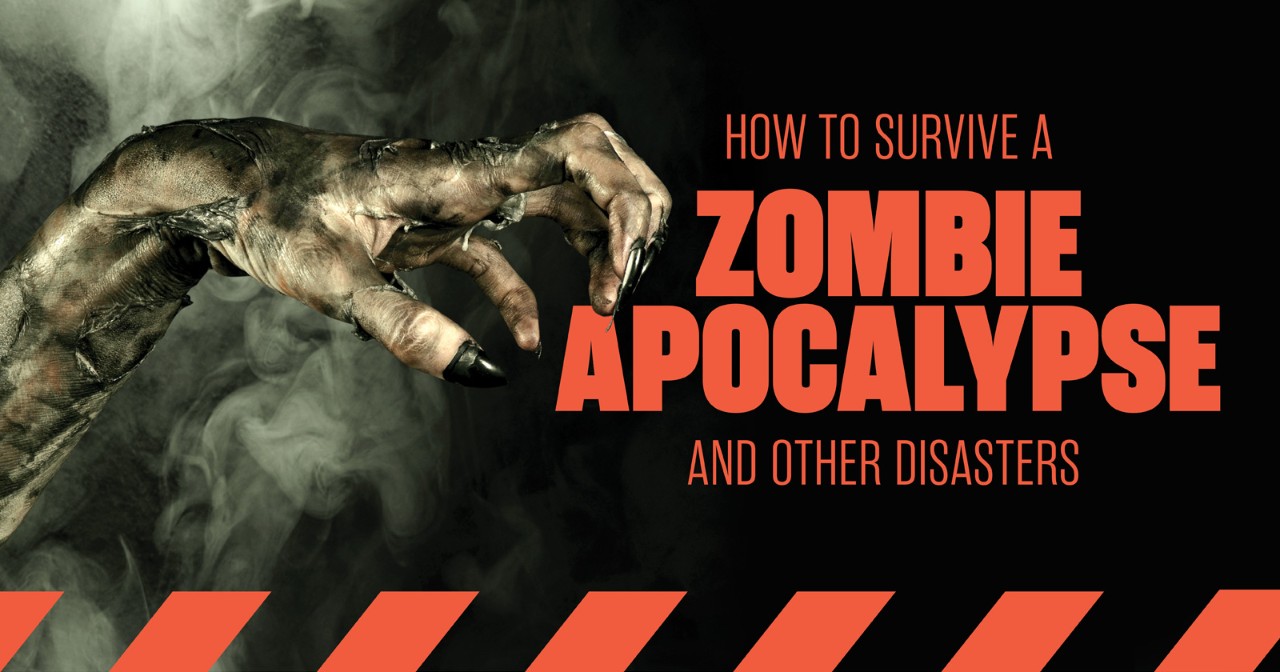


March 03, 2025
The undead are alive and well.
Reanimated corpses are taking over classrooms and lecture halls—and no, that’s not a metaphor for sleep-deprived undergraduates. At UD, professors and alumni are leveraging zombie-inspired games and media to teach disaster preparedness and response.
“People sometimes assume these are frivolous exercises,” says AR Siders, assistant professor of public policy who studies the value of gamifying problems. “While they are fun, they’re also valid and important.”
Thanks to UD’s globally recognized Disaster Research Center, or DRC, the University already has a storied legacy within the world of disaster research. With its foray into zombie lore, Blue Hen experts are tapping into an engagement strategy government agencies have long employed—in 2011, the Centers for Disease Control and Prevention issued a detailed guide for surviving a zombie apocalypse. Four years later, the Pentagon released CONOP 8888, a battle plan for coping with flesh-eating invaders.
People sometimes assume these are frivolous exercises. While they are fun, they’re also valid and important.”

Leveraging pop-culture appeal draws the public into the topic of disaster preparedness. Once there, people receive actionable advice—strategies for surviving a herd of cannibalistic night walkers are transferable to other, real-world catastrophes. It’s the reason the Maryland Department of Emergency Management sent out a recent tweet listing their must-have items for zombie armageddon. (“Chainsaws. Like a lot of chainsaws.”) Marcia Deppen, AS98, 00M, a director of consequence management for this department and a former emergency preparedness coordinator at UD, is a big proponent: “I once themed a presentation for foster kids in Wilmington around the rules of Zombieland, the Woody Harrelson movie,” she says, adding: “I love zombie everything.”
Now, professors on campus are incorporating zombie films into their curriculum—including Brad Pitt’s 2013 thriller World War Z—as a way to critically examine myths surrounding societal response to disaster. (Spoiler alert: People don’t devolve into mass hysteria, but that perception may lead officials to withhold crucial information from the public).
In a “Culture, Health and Environment” class taught by Anthropology Professor Jennifer Trivedi, students play a tabletop, role-playing game that she invented, requiring them to work in groups in order to survive an unfolding zombie apocalypse. As players succumb to the virus, pressure mounts. The experience thrusts the undergraduates—many of them aspiring emergency management practitioners—into greater identification with the fast-paced nature of decision making in an emergent situation. It also “brings a little joy,” into a discipline that, Trivedi says, can feel relentlessly heavy or—for students who've lived through actual disaster scenarios—triggering.
This is about cultivating a playful mindset. It unlocks creativity.”
The game raises important ethical questions: Are zombies perpetrators—or victims? Can you experiment on them to develop a vaccine? Who do we consider fully human? This sparks critical thought about which communities deserve and receive help during a (nonfiction) catastrophe since research reveals systemic inequality permeates disaster response.
“When we talk about mutants being discriminated against, then we’re not talking about a particular form of racial or religious or gender discrimination, which a person might have really personal feelings about,” Siders says. “This opens up the dialogue in a way that feels safe.”
If nothing else, contemplating the zombie apocalypse forces students to confront the unexpected—a crucial skill for disaster response professionals of the future.
“This is about cultivating a playful mindset,” Siders says. “It unlocks creativity and allows students to experiment with new ideas in a low-stakes, no-judgment way.”
Which is comforting to hear, because if the zombies do invade, we’ll need all the ideas we can get.
Contact Us
Have a UDaily story idea?
Contact us at ocm@udel.edu
Members of the press
Contact us at 302-831-NEWS or visit the Media Relations website


